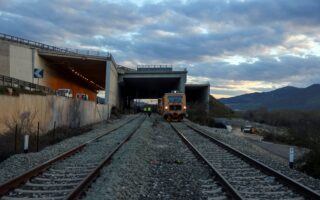Reform, rebuilding and Tempe

The public’s anger and outrage caused by the horrific train collision in northern Greece and the subsequent revelations about its causes are the dominant story shaping the election campaigning. The deadly accident is a defining moment that has turned a more or less predictable confrontation between the parties – with the more or less usual dilemmas, with lots of noise and polarization – into an almost monothematic debate, revealing a pressing need to change the way the state operates.
Pressing, because this debate is no longer just about the level of service provided to citizens, but, as it turned out in the most tragic way, their very lives and the lives of their children. Parties will undoubtedly be asked to provide answers. But what they primarily need to convince people about is not how they will change the structural problems of the state, but that they really want to change it.
As complaints about the way the state operates and the level of services offered are long-standing, its change has also become a constant political promise on the path to power. It was either sold as “reform,” or “modernization,” or “rebuilding” of the state – every time an impressive word was used to pledge what was required to happen, but it was just words.
Abstentions and so-called anti-systemic votes have strengthened, showing that the public does not believe there is any political will for radical change
The first polls after the tragedy at Tempe are more or less to be expected and confirm that the public’s distrust and abhorrence of the political system is growing. Abstentions and so-called anti-systemic votes have strengthened, showing that the public not only wants to punish the main political parties responsible for the miserable state of public infrastructure, but also that it does not believe there is any political will for radical change and rooting out systemic problems.
All the ills plaguing the state and highlighted once again with the disaster at Tempe – the I-can’t-be-bothered attitude of employees charged with the critical task of facilitating and monitoring transport, the absence of any evaluation, the deficiency in training and knowledge, clientelism, ditching work early, the attempt to shift responsibility onto someone else, public sector mobility that leaves agencies and watchdogs understaffed – have been known to the public for many years. One way or another, people have had to face the consequences of these problems when using state services. By voting in the past for politicians who promised to tackle these issues they showed that they wished to eradicate them.
But the rising percentage of abstentions in the elections shows that now a very large percentage of voters do not believe that politicians want or are able to change those problems. That is why the first requirement for the main parties right now is not to say what they intend to change, but to convince the public that they really want to and can break some eggs.





